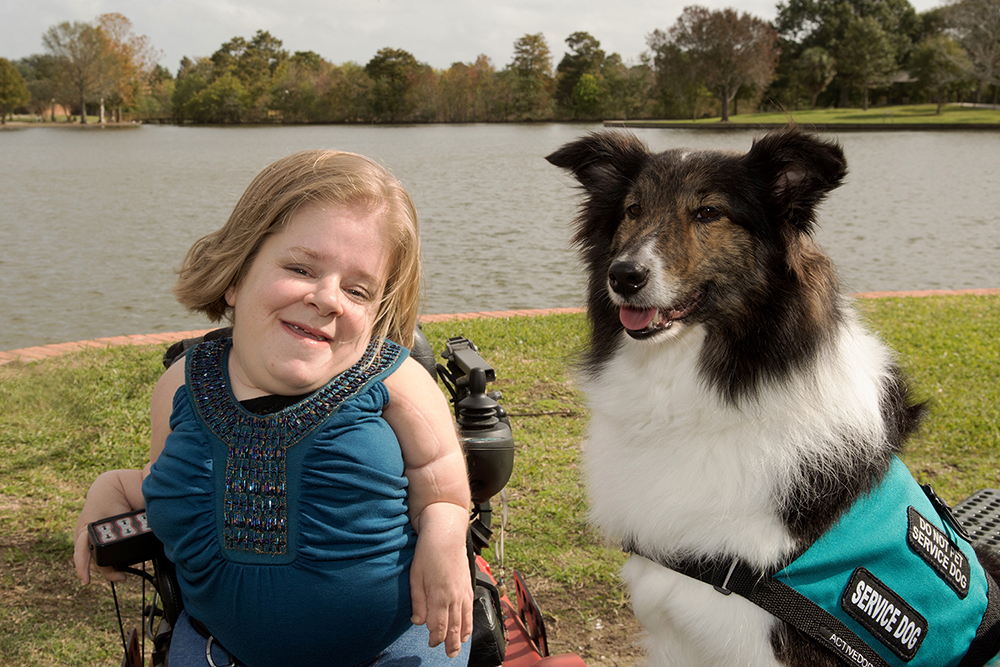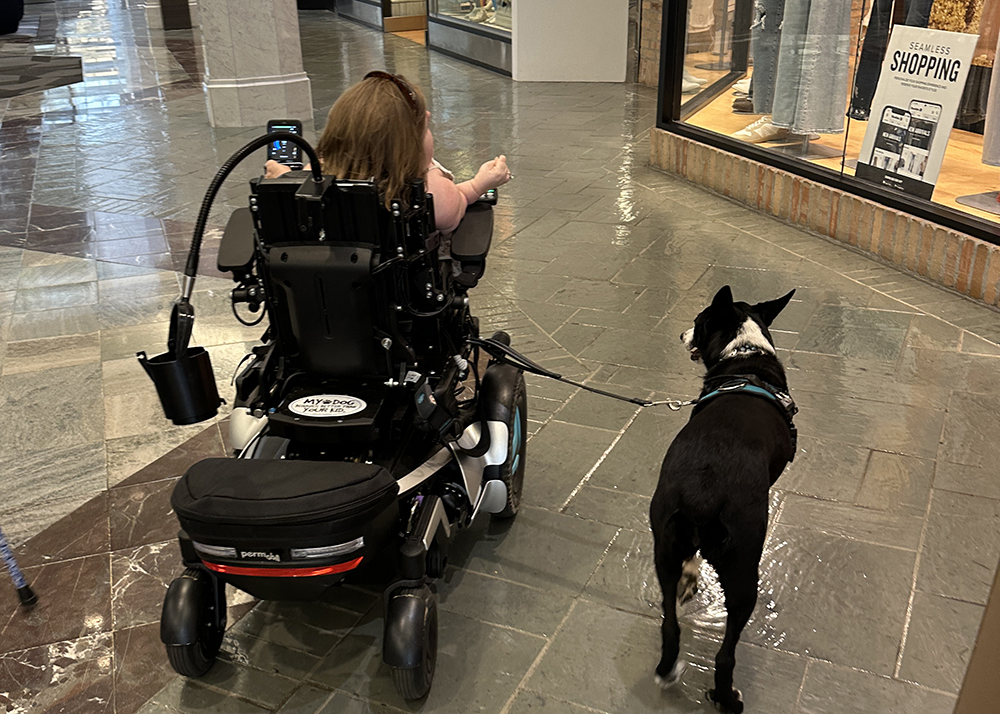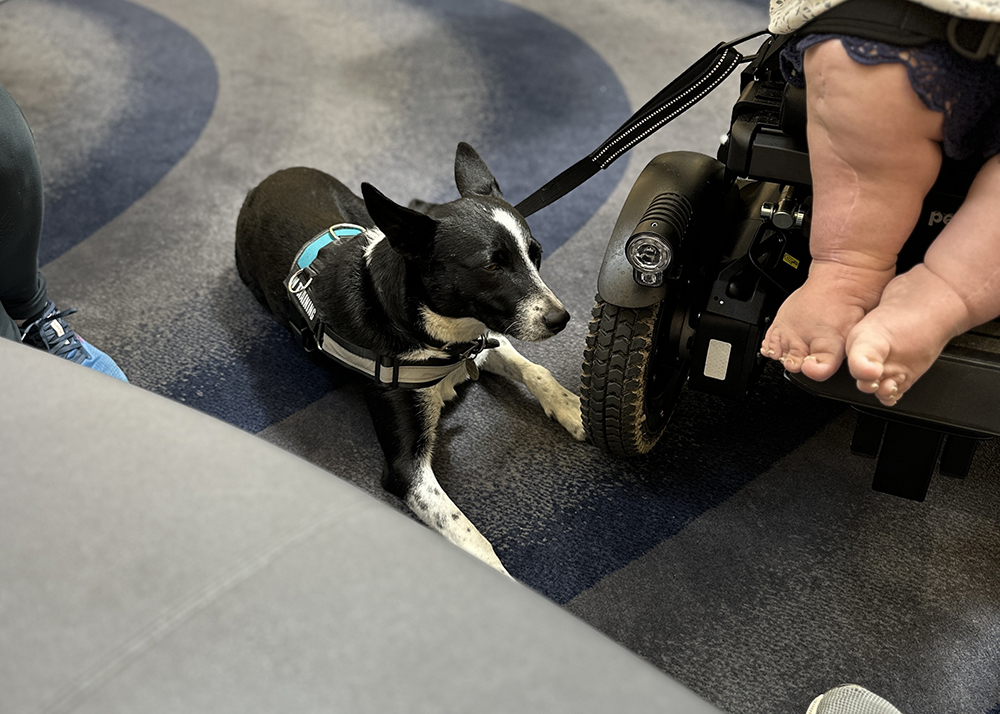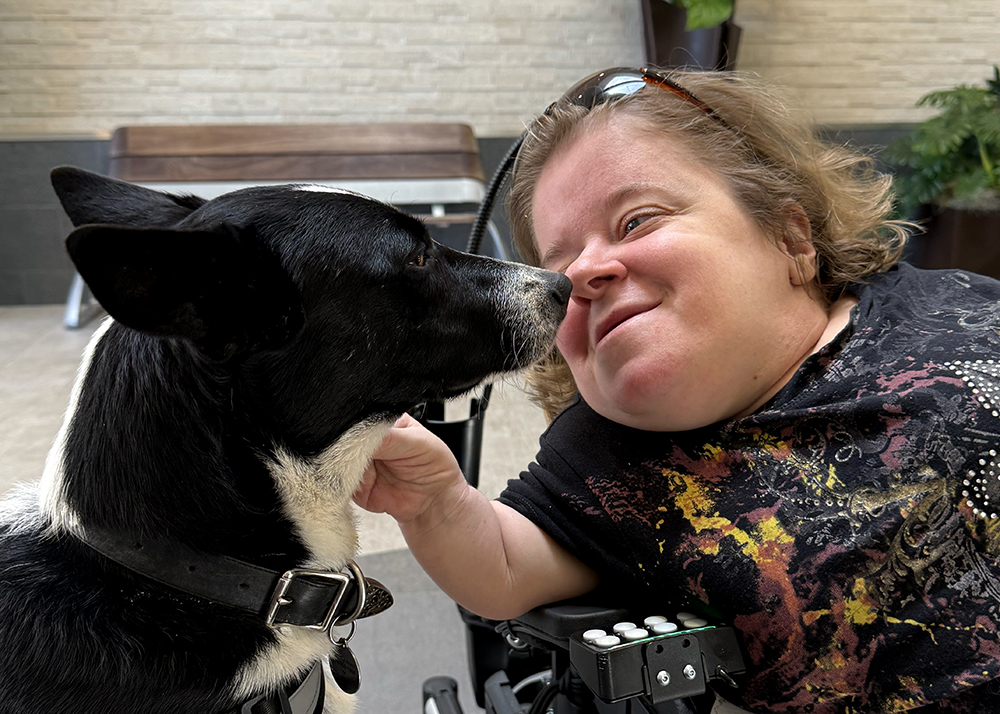“Can You Train Your Own Service Dog?”
Today I have the pleasure of sitting down with Ann Becnel of Ann Becnel Companion Dogs, LLC to talk about all things service dog related. Ann has over twenty years of service dog training experience, and she helped me train my own first service dog, Lexie, many years ago. It was definitely one of the most rewarding experiences I’ve ever had. Not only did Lexie learn to help me in my day-to-day activities, but our bond became much stronger through her training.

Unfortunately Lexie passed away about two years ago, but now we have Penny, a three-year-old McNab Shepherd, that I have begun self-training with Ann. After some trolling and misconceptions were brought to life through one of my Facebook posts recently, I thought it might be nice to clear some of those up with an interview with an expert! Thank you, Ann, for taking the time out of your busy schedule to talk with me. Let’s get right to it:
Firstly, what does a dog have to do/have to be considered a service dog?
In order to qualify as a service dog, a dog has to have impeccable obedience. They have to learn a task that helps their person navigate a medical issues, and they have to be housebroken. For me, as a trainer, they have to pass the Canine Good Citizen Test, the Canine Public Access Test and be able to perform at least one task for their person reliably. There’s no formal “service dog certification” under the Americans with Disabilities Act, but that’s what I require from my students.
In public, how can I tell that a dog is a service dog? Will every service dog have a vest on?
Well, service dogs, to me, are pretty easy to spot because they’re basically perfect.
They have fabulous obedience. They don’t have any behavioral issues. They’re not barking, they’re not pulling, they’re paying attention to their person. They may be performing a task for their owner, and they’re very easy to spot. However, a fake service dog is also very easy to spot, but usually they’re screwing up in some sort of way – they’re not heeling, they’re not paying attention to their person.
Service dogs don’t legally have to wear vests, but I always encourage my students to have one because it’s just easier as far as letting people know not to engage with the dog.
If I see someone with a service dog in public, how do I act around them?
You completely ignore them and mind your business. Just go about your day as normal.
“And do they always have to wear a vest?”
They don’t legally. They do not have to wear a vest, but I always encourage my students to have a vest because it’s just easier as far as letting people know.
Are businesses allowed to ask someone with a service dog what type of service the dog performs?
Businesses are allowed to ask if your dog is a service dog and what task your dog performs for you. They are not allowed to ask what your medical condition is, and they are not allowed to request that the dog demonstrate their service. It’s illegal for businesses to deny entry to a legitimate service dog. I’ve never been denied with any of my students, though I’ve heard stories of some smaller establishments where this has happened. I think that’s probably because these private small business owners may not have been up to date on the laws, but most average businesses do not deny entry to service dogs.
How do people prove that they have a service dog?
There really is no proof because there’s no registration or certification. All of the articles online that advertise getting a “certified service dog” are scams. I think that most people can tell a service dog that’s very well trained versus a dog that has a fake service dog card that their owner bought online.
Can you tell us the difference between emotional support dogs, service dogs and therapy dogs?
Service dogs are trained to assist their person with a medical condition. They have the most amount of training out of the three, and they have to have impeccable public obedience. They can’t have any behavioral issues, they must be housebroken and they’re allowed to basically go into any public place. They are granted complete access to go anywhere their person goes.
The emotional support dog title is only used to get in a building (like an apartment), and they often don’t receive any kind of specialized training. Emotional support dogs have no public access privileges.
Therapy dogs, depending on what kind of therapy dog they are, need impeccable obedience training, and then some specialized therapy dog skills beyond the basics. They have a registration process so that they can get liability insurance to go into hospitals and nursing homes. There are companies, like Pet Partners, that will test the dog and the human to make sure they are a legitimate therapy dog team. If they pass all the tests, the company will give them a two-year registration and liability insurance. Like emotional support dogs, therapy dogs have no automatic public access privileges unless permission is granted by a hospital or nursing home in advance.
True or False: Only labs, German shepherds and golden retrievers can be service dogs.
False. You can train any dog as your own service dog. And I’ve had many different breeds, many different mixed breeds. To me, it’s more about having a stable mind than a particular breed. Any dog that is brave, focused and have perfect obedience. There’re not many dogs out there who fit that bill.
On average, how long does it take to train your own service dog?
I’d say average is two years, beginning to end, to train your own service dog. You’re asking a lot from a dog. It’s hard for them to master all of the skills to not only behave in public, but also learn the task that they are to perform for their person.

What do you think about my new service dog in training, Penny, and what strategies are you using to help me train her?
I am an ‘all-positive’ dog trainer. I would never hurt a dog. Penny is being trained in a very positive, loving way and she enjoys her work. Penny is bred to be a working dog, so she enjoys the challenges and learning new skills. It’s easy to see.
In closing, is there anything else you’d like to say about service dogs or training your own service dog?
It’s a wonderful thing that there’s the Americans with Disabilities Act that allows anyone to train their own dog to become a service dog. Most people don’t know how to do it, so they need a trainer, like me. But I think that it’s just a wonderful thing that people can use their dogs to help them with any medical condition and gain more independence.
That wraps up my conversation with Ann. I’m so grateful to her for taking the time to chat with me and clear up some common questions.

So, can you train your own service dog?
Absolutely—but it takes time, patience, consistency, and the right guidance. With the right dog, a solid foundation of obedience, and support from an experienced trainer like Ann, it’s not only possible, it can be incredibly rewarding. Whether you’re just starting to explore this path or already deep into the training process, remember that you’re building something meaningful, not just a helper, but a partnership that can truly change your life.

